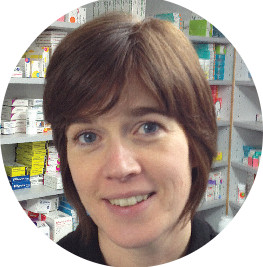Conditions

Questions about infant feeding
In Conditions
Bookmark
Record learning outcomes
Parents welcome the advice of healthcare professionals for infant feeding. We look at the latest guidance and ask how you can grow your share of this important category

The WHO and UNICEF recommend that women exclusively breastfeed their babies for the first six months and then continue alongside solid food for two years or more. Yet while the majority of women breastfeed during the early weeks, by the six to eight-week check-up, only 47.2 per cent of babies are still exclusively breastfed in England (NHS England data).
At three months numbers drop to 17 per cent and at six months it’s just 1 per cent. More mothers combine breast and formula feeding, with 34 per cent doing this at six months. We put the top feeding questions that parents might ask to Rosemary Dodds, senior policy advisor at the National Childbirth Trust.
Q. There’s a history of eczema and allergy in my family – how should I feed my baby to reduce his risk?
A. Giving only breastmilk for about the first six months is the safest way to reduce risk of allergies. However, some women don’t want to breastfeed, and that is their decision so they shouldn’t be pressurised into it. Parents who have any questions or problems can seek support services in their local area such as breastfeeding drop-ins or baby cafés.
Q. What are the main health benefits of breastfeeding?
A. In the UK, the immediate advantages start with colostrum, which lines the baby’s gut and provides a range of immune factors from immunologobulins to lactoferrin, which reduces bacterial growth as well as many different oligosaccharides, enzymes, hormones and growth factors that can’t be replicated.
Formulafed babies have a higher incidence of infections, such as gastroenteritis, respiratory, ear and urinary tract infection, as well as Sudden Infant Death Syndrome (SIDS). In later life they are more at risk of diabetes and leukaemia.â€
Q. Are there any medicines that are safe to take when breastfeeding?
A. Manufacturers are never keen to say that any medicine is safe for babies while mothers are breastfeeding and each individual case should be considered on balance. Sometimes it is essential that mothers continue to take their medication. The need to take medication, however, very rarely means that women need to stop breastfeeding.
Q. Do I need to take extra vitamins when breastfeeding?
A. A supplement of 10μg vitamin D is recommended for mothers because very few gain enough vitamin D from their diet or sunshine.
Q. What’s the latest advice on when and how to introduce solids?
A. Evidence indicates that most babies are ready for solid foods at about six months of age. By then, they can sit up, grasp food with their hands and bring it to their mouth at that age and their digestive system has developed to cope with foods other than milk.
Vegetables and meat, either as strips or mashed, can be given as first foods. This is also true for babies with a tendency to develop allergies. Introducing one food at a time may help you see any foods that your baby is sensitive to.
Q. When is it safe to give cow’s milk?
A. Babies can have cow’s milk in foods such as mashed potatoes or cereals from six months, but it is not recommended as a main drink until they reach 12 months of age. The NCT runs a free helpline (0300 330 0700) staffed by qualified practitioners for parents or professionals.
The baby feeding market
The baby food, milk and drink market reached £656 million in 2014 (Mintel), up 29 per cent since 2009. Baby milk accounted for 62 per cent of sales. There is a belief among pharmacists that much of their baby feeding sales have been lost to grocery for ever, but others think that taking a different approach can make you a centre for feeding advice and win back sales.
“Pharmacists and their teams are ideally placed to provide advice and support to mothers when it comes to infant feeding. From giving practical tips and support on breastfeeding to identifying and advising on potential problems, the pharmacy team can make a real difference to young families in those early months,†says Michael Stewart, information pharmacist at Numark. Mark Bentley, senior manager, healthcare Nutricia team, at Nutricia Early Life Nutrition, agrees.
“Many community pharmacists have not realised the full extent of the opportunities that exist for them to provide an advice service in their local communities,†he says. “Those pharmacies that proactively seek to offer advice and support to parents are the ones that flourish, winning loyal customers for life and growing their business.â€
“One area of opportunity is the support that pharmacy teams can give to parents when babies experience functional gastrointestinal disorders such as colic, constipation or reflux. These affect up to 50 per cent of babies.â€
Specialist advice source
Specialist infant formula is one area where pharmacists could provide a valuable service to those mothers who are unable to breastfeed and whose babies have an intolerance or a sensitivity to regular formula milk, or for those women whose baby has a problem such as reflux, colic or constipation. The OTC specialist milks category is now worth £23.2 million, with sales up 15 per cent year on year (IRI June 2015).
“Many pharmacies are benefiting from adopting a merchandising approach, with clear signposting to ‘Ask the pharmacist for advice’,†says Mr Bentley. “There has been an increase in the number of babies who do not thrive on standard formulas, which is why much of the growth in the infant formula market over the past year has been driven by an increase in purchases of specialist milks, aimed at addressing feeding problems," says Claire Magee, managing director of NannyCare.
“This offers a genuine opportunity for pharmacists because such products sit well with the pharmacy’s role as a provider of healthcare advice and remedies. By stocking one or two of these products, the pharmacy would be in a position to provide a possible solution.â€
She stresses the importance of understanding the difference between formula types. “Supermarkets all sell similar ranges and they don’t have trained staff to give advice. It’s better to specialise and establish a point of difference.â€
“More babies seem to be intolerant of cow’s milk these days, so it’s important to stock some alternatives,†says Lila Thakerar, pharmacist at Shaftesbury Pharmacy in Harrow. Make sure mums know they can get these on prescription if their baby has a diagnosis, so it’s important they see their GP.â€
Be more proactive
“Many pharmacy teams are afraid to have conversations with parents when they are approached for advice on basic problems such as colic,†says Mr Bentley. “The advice I would give is not to be afraid to have conversations with customers about infant feeding. There is a wealth of great training resources available to build your knowledge, and the key is to be prepared to put this into practice and make parents aware of the advice service.â€
He cites the example of Weldricks Pharmacy, which, in a trial last year, grew its baby category by 65 per cent in the test stores with trained staff and an advertised baby service. Mr Stewart says pharmacists can play an important role in the WHO’s First 1,000 Days concept of nutrition for infant long-term health. “The pharmacy profession can contribute significantly to the First 1,000 Days concept,†he says.
“Encouraging mothers to breastfeed for at least six months is a high priority for the NHS. Given the location and easy access to pharmacies, we should consider providing practical support for breastfeeding, such as the short-term loaning of expressing equipment and liaising with breastfeeding counsellors.†Ms Magee agrees and says promoting the fact that advice on feeding is available is crucial.
“Providing advice our competitors aren’t able to give is key, so training your staff to help parents is essential if you want to grow your baby feeding category,†says MsThakerar. “Make a point of engaging in conversation with new mums when they come into your pharmacy.â€
Comment
 Shaheen Bhatia, Broadway Pharmacy, Bexleyheath “Some mothers do have difficulty with the feeding side of things for their newborn and people perhaps don’t see a health visitor as much as they used to. But I’d say that for many independent pharmacies, sales of baby milks generally have gone down. People definitely head to the supermarkets more because they think they’re going to get the best deals there. They do still come to us for advice but they only tend to come for that advice when the child is being sick or is still hungry. We all have to work out what we’re able to sell within our local community. You don’t want to stock your shelves unnecessarily because these are products that go out of date quite quickly and take up space. But it’s great when mums realise that they can come to pharmacy for health advice.â€
Shaheen Bhatia, Broadway Pharmacy, Bexleyheath “Some mothers do have difficulty with the feeding side of things for their newborn and people perhaps don’t see a health visitor as much as they used to. But I’d say that for many independent pharmacies, sales of baby milks generally have gone down. People definitely head to the supermarkets more because they think they’re going to get the best deals there. They do still come to us for advice but they only tend to come for that advice when the child is being sick or is still hungry. We all have to work out what we’re able to sell within our local community. You don’t want to stock your shelves unnecessarily because these are products that go out of date quite quickly and take up space. But it’s great when mums realise that they can come to pharmacy for health advice.â€
Â
 Rena Dadra, Village Pharmacy, Harlington “We have quite a wide range of stock in this category and having the right products is the most crucial thing to get right. Aptamil is a popular choice and we often have people coming to us because they can’t get the brand elsewhere. The price at which we can offer products such as this is quite a difficulty for a small business like ours, especially as we have a Co-op store next door. Large companies can sell baby milks at a much more competitive price. Because they buy thousands in one go they can reduce the price, but we can’t. For example, we’ve had a customer come in and return a product and say, ‘Look, I can get it for a fraction of the price next door.’ You try to explain to them the reasons, but there isn’t much point really. I do think that our infant feeding sales are down at the moment.â€
Rena Dadra, Village Pharmacy, Harlington “We have quite a wide range of stock in this category and having the right products is the most crucial thing to get right. Aptamil is a popular choice and we often have people coming to us because they can’t get the brand elsewhere. The price at which we can offer products such as this is quite a difficulty for a small business like ours, especially as we have a Co-op store next door. Large companies can sell baby milks at a much more competitive price. Because they buy thousands in one go they can reduce the price, but we can’t. For example, we’ve had a customer come in and return a product and say, ‘Look, I can get it for a fraction of the price next door.’ You try to explain to them the reasons, but there isn’t much point really. I do think that our infant feeding sales are down at the moment.â€
Â
 Fiona McElrea, Whithorn Pharmacy, Whithorn “We’re a rural pharmacy, with very few shops in the town, so we need to keep a range of infant feeding products. The next place to buy milks is seven miles away. However, despite this we still can’t compete with the multiples on price and we don’t make much. We do get a lot of young mums coming in and give a lot of advice around child health. It’s good to have this category in stock because you can then get mums in from the start and give them advice all the way through as the child grows up. From that point of view, it’s actually a very important category.â€
Fiona McElrea, Whithorn Pharmacy, Whithorn “We’re a rural pharmacy, with very few shops in the town, so we need to keep a range of infant feeding products. The next place to buy milks is seven miles away. However, despite this we still can’t compete with the multiples on price and we don’t make much. We do get a lot of young mums coming in and give a lot of advice around child health. It’s good to have this category in stock because you can then get mums in from the start and give them advice all the way through as the child grows up. From that point of view, it’s actually a very important category.â€
